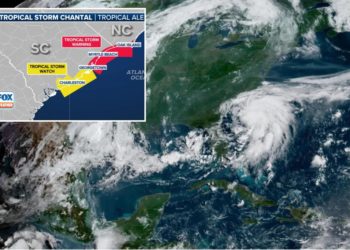Japanese hot springs—better known as onsens—are prized for their zen experience, with travelers coming from around the world to lounge in natural pools and bliss out.
The country is home to 27,000 natural hot spring sources, but a surge in tourism has left some onsen towns running low on water; leaving local officials feeling anything but zen.
One of those troubled towns is Ureshino.
Tucked away in the mountain range of the Saga Prefecture, on the western island of Kyushu, Ureshino is home to some of Japan’s most coveted onsens, run by more than 30 hotels and ryokans, the traditional Japanese inns.
Originally a hot spot among domestic tourists, the city of 25,000 residents is gaining popularity among international travelers as millions flock to Japan.
Local officials have recently issued warnings about the impact of overtourism on the supply of onsen water in the town.
“Compared to before the Covid-19 pandemic, the number of tourists has increased, which led to greater hot spring usage at ryokans and other facilities,” Ureshino City’s Deputy Mayor Hironori Hayase said at a recent press conference.
The average water level at the Ureshino supply dropped to a record low of 39.6 meters (130 feet) at one point last year, marking a 20% dip compared to the 50-meter (160 feet) level recorded four years ago, Japanese national broadcaster NHK reported.
Mayor Daisuke Murakami stressed the source remained sustainable, but officials called on hotels and ryokans to limit the use of private in-room baths during late-night hours.
Private onsens are particularly sought after by international tourists because communal onsens require visitors to enjoy their dip fully naked – a custom many foreign travelers aren’t familiar with, or feel squeamish about.
Entry fees for communal onsens cost as little as $3, but many would rather pay a premium, of up to hundreds of dollars, for a private experience in their hotel rooms. The demand means more water has to be pumped to private rooms, putting pressure on the supply.
“We recognize that Ureshino City relies on tourism, so we must make every effort to protect it. In doing so, we will not hesitate to take any necessary measures,” he said.
The traditional bathing experience is believed to come with health benefits, from relieving mental stress and muscle tension to improving skin conditions.
But not every pool of heated water qualifies as an onsen. Japan has strict laws governing one of the country’s most iconic activities, widely considered a natural treasure.
Onsen water is heated by thermal energy underground and has to remain at least 25 degrees Celsius (77 degrees Fahrenheit) when it surfaces to the ground, according to the country’s onsen law, which also specifies several kinds of minerals the water must contain.
The number of foreign visitors to the country hit an all time high of 36.8 million last year, according to data from the Japan National Tourism Organization. The surge in tourism has piled pressure on several popular onsen areas across the country, from Ureshino in the west to Niseko on the northern island of Hokkaido, said researcher Akihiro Otsuka of the Chuo Onsen Research Institute.
“The increase in tourists after Covid-19 has led to an expansion of hotels, larger facilities, and more private onsen baths in individual rooms,” said Otsuka.
In Niseko, the water supply level has dropped by 15 meters (49 feet) in the past three years, local press reported.
Tourism is not the only factor affecting water supplies in onsen towns, according to Otsuka, who said that corroded pipes and aging pumping infrastructure contributed to an unnecessary loss of water. “Many onsen areas are struggling with aging facilities that have not been properly maintained,” he said.
Onsens not currently facing water shortages are still dealing with the first symptom of overtourism: overcrowding.
Ginzan Onsen, located in the Yamagata region about 260 miles north of Tokyo, now limits entry to day trippers during winter peak season to minimize their impact on local residents.
The post Japan’s natural hot springs are running low. Overtourism is to blame appeared first on CNN.




